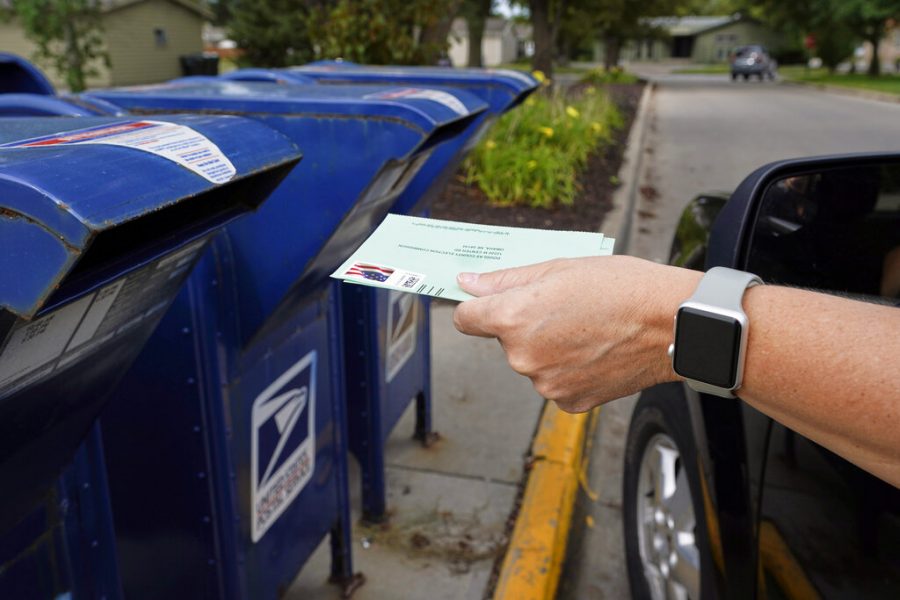Overseas Filipinos Gear Up for 2022 Philippine Elections
FILE – In this Tuesday, Aug. 18, 2020, file photo, a person drops applications for mail-in-ballots into a mail box in Omaha, Neb. Mail voting is starting in the presidential election as North Carolina is sending out its first batch of ballots. The battleground state on Friday begins to send out about 600,000 ballots to voters who’ve requested them. Those voters are overwhelmingly Democrats and independents, reflecting a partisan split in voting methods that’s developed since President Trump started attacking mail voting in March. (AP Photo/Nati Harnik, File)
Across the globe, the roaring clamor of Filipinos is clear — go register to vote and actually vote when it’s time. Put in a unique spot, overseas voters can cast their ballot by mail as early as April 10 before the official election day on May 9.
Originally, the deadline for voter’s registration was on Thursday, Sept. 30. On that same day, President Rodrigo Duterte signed Republic Act 11591, extending the deadline until Oct. 30.
“The last day of registration of voters for the 2022 National and Local Elections shall be thirty (30) days after the effectivity of this Act,” RA 11591 reads.
However, the extension only applied to voters based in the Philippines.
For overseas Filipinos, they only had until Oct. 14 — even if the law doesn’t explicitly make a distinction between local and overseas voters.
This raised a question of legality for some.
Nerissa Allegretti, midwest coordinator for the National Alliance for Filipino Concerns (NAFCON), worked on a campaign to extend the registration particularly because of Covid-19 restrictions, time constraints and lack of proper information dissemination.
“Because of Covid, it’s even harder to vote,” Allegretti said. “If they’re overseas … and not looking into the consular announcement and have no access to [that] information, they might not even be able to vote because their names might already be taken away.”
Those who did not vote during the 2016 national elections must re-register due to inactivity in two consecutive polls.
Jing Diggs, who is originally from Quezon City but now resides in a western suburb of Chicago, was one of them.
On Oct. 8, right after current vice president and opposition leader Leni Robredo officially announced her presidential bid, Diggs decided to vote for the first time since 1992 — even saying that Robredo’s candidacy was “the deciding factor” if she would vote or not.
“I’ve always been apathetic about Philippine politics, but it’s been too much,” Diggs said. “This time, hopefully my vote will count.”
Diggs was committed to voting this time around. She requested to leave work early to ensure that she could, since the consulate is only open on weekdays from 9 a.m. to 4 p.m.
Allegretti wishes the process was more accessible for people voting abroad and suggested possible alternatives.
“I tried to call last week and told them [consular representatives] that what if the Filipino community can organize in a church or Seafood City and get people registered on a particular weekend,” Allegretti said. “They said it’s too late. They don’t have the manpower.”
In the midwest, all of its 12 states are under one consular office in downtown Chicago. Meaning there’s only one location for potential voters to go to.
This presents more complications for those who are undocumented and live miles away from the city.
“Many of our kababayans [countrymates] who are undocumented are afraid to go out and think they are living in the shadow,” Allegretti said. “Who will drive to or fly to Chicago [on a weekday] when everyone’s busy working?”
According to the study of Migration Policy Institute, there were an estimated 313,000 undocumented Filipinos in the U.S. from 2012 to 2016.
“This is not a joke… compare voting [to] losing their job,” Allegretti adds. “It’s not only the main family, there are still extended families [that will be affected.]”
DePaul University professor and researcher Micaela Cayton Garrido, who worked as an elections monitor in the Philippines and Uganda, sees yet another issue that may arise this election season — social media.
“One of the biggest risks of the elections is the role of social media … no one was really paying attention to what happened to the Philippines in 2016 and only realized afterwards,” Garrido said, noting the rampant disinformation during the national elections. “A lot of that came from the Facebook feeds.”
Facebook has completely saturated the Philippines with around 76 million users as of July 2020 out of the country’s population of 110 million — largely because the app has been free in the country since 2013. Users can access the app even without WiFi or mobile data.
For many Filipinos, this opened the door to the online world.
“When you’re working in a country where people will get their news where they can get it for free, that’s [already] the best,” Garrido said.
With less than seven months away from election day, Garrido commits to spreading accurate and fact-checked information and reminding peers to base their votes on the truth.
“I’m just hoping that people really try to see what is the real legacy of those folks and look into how they performed in their current position [because] there are still revisionist narratives and pure denial of the damage that was done,” Garrido said.
Correction: The photo initially chosen for this story was changed because the original photo did not accurately reflect the content of this story. In addition, a line was changed to say that there was “less than seven months” until election day rather than “six months” in order to give the most accurate time frame.







